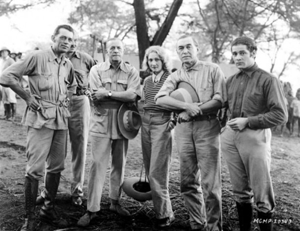William Frederick Gowers
|
Sir William Frederick Gowers KCMG |
|
|---|---|

Sir William Frederick Gowers (second from left), poses with members of the 1931 Trader Horn movie company: director W.S. Van Dyke, Edwina Booth, Harry Carey and Duncan Renaldo
|
|
| Lieutenant Governor of Northern Nigeria | |
|
In office 1921–1925 |
|
| Preceded by | Herbert Symonds Goldsmith |
| Succeeded by | Sir Herbert Richmond Palmer |
| Governor of Uganda | |
|
In office 18 May 1925 – 23 Nov 1932 |
|
| Preceded by | Geoffrey Francis Archer |
| Succeeded by | Bernard Henry Bourdillon |
| Personal details | |
| Born | 31 December 1875 |
| Died | 7 October 1954 (aged 78) |
| Relations | William Gowers (neurologist) (father), Ernest Gowers (brother) |
Sir William Frederick Gowers, KCMG (31 December 1875 – 7 October 1954) was a British colonial administrator who was Governor of Uganda from 1925 to 1932.
Gowers was born 31 December 1875 in London. He was educated at Rugby School and then at Trinity College, Cambridge, where he graduated BA in 1898 with a First in the Classical Tripos. He retained his interest in the classics throughout his life. He went to Africa in 1899 as an employee of the British South Africa Company (BSA) and became an assistant Native Commissioner in Matabeleland, in what is now western Zimbabwe, leaving this post in 1902.
He was the elder brother of Ernest Gowers.
In 1902, Gowers resigned from the BSA and joined the Colonial Service, taking the job of third-class resident in Northern Nigeria. He took up this post two years after the Protectorate of Nigeria had been declared, and saw the occupation of the Moslem Emirates of the region under Frederick Lugard's policy of indirect rule. During the First World War Gowers served as political adviser in the Cameroons Expeditionary Force (1915–1916). He rose to the position of Lieutenant-Governor of the Northern Province of Nigeria.
From 1925 to 1932 Gowers was Governor and Commander-in-Chief of the Uganda Protectorate. Soon after taking office, Gowers proposed a remedy to the practice of payment of envujo on cash crops, which colonial officials had denounced as "repugnant to justice and morality". His recommendation was to make envujo payable to the British administration rather than to African landlords. On the question of the Toro Kingdom, which the British had restored after driving out the Banyoro, Gowers felt that the agreement made at the time was simply a declaration of principle by the protecting power. The British were free to deal with the kingdom as they saw fit.
...
Wikipedia
